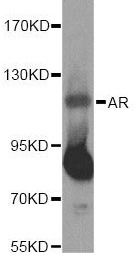Products
androgen receptor antibody
Category:
Research Area:
| Synonyms: | AIS antibody, androgen receptor antibody, AR antibody, DHTR antibody, Dihydrotestosterone receptor antibody, HUMARA antibody, HYSP1 antibody, KD antibody, NR3C4 antibody, SBMA antibody, SMAX1 antibody, TFM antibody | ||
| Catalogue No.: | FNab00388 | Reactivity: | Human, Mouse |
| Host: | Rabbit | Tested Application: | ELISA, WB, IHC |
| Clonality: | polyclonal | Isotype: | IgG |
- SPECIFICATIONS
- Product Name
- androgen receptor antibody
- Catalogue No.
- FNab00388
- Size
- 100μg
- Form
- liquid
- Purification
- Immunogen affinity purified
- Purity
- ≥95% as determined by SDS-PAGE
- Clonality
- polyclonal
- Isotype
- IgG
- Storage
- PBS with 0.02% sodium azide and 50% glycerol pH 7.3, -20℃ for 12 months (Avoid repeated freeze / thaw cycles.)
Immunogen
- Immunogen
- androgen receptor
- Alternative Names
- AIS antibody, androgen receptor antibody, AR antibody, DHTR antibody, Dihydrotestosterone receptor antibody, HUMARA antibody, HYSP1 antibody, KD antibody, NR3C4 antibody, SBMA antibody, SMAX1 antibody, TFM antibody
- UniProt ID
- P10275
- Observed MW
- 100 kDa
Application
- Tested Applications
- ELISA, WB, IHC
- Recommended dilution
- WB: 1:500 - 1:2000; IHC: 1:50 - 1:100
Validated Images
 22RV1 cells were subjected to SDS PAGE followed by western blot with FNab00388(AR antibody) at dilution of 1:1000
22RV1 cells were subjected to SDS PAGE followed by western blot with FNab00388(AR antibody) at dilution of 1:1000
 Immunohistochemistry of paraffin-embedded mouse brain tissue slide using FNab00388( AR Antibody) at dilution of 1:50.
Immunohistochemistry of paraffin-embedded mouse brain tissue slide using FNab00388( AR Antibody) at dilution of 1:50.
- Background
- The androgen receptor gene is more than 90 kb long and codes for a protein that has 3 major functional domains: the N-terminal domain, DNA-binding domain, and androgen-binding domain. The protein functions as a steroid-hormone activated transcription factor. Upon binding the hormone ligand, the receptor dissociates from accessory proteins, translocates into the nucleus, dimerizes, and then stimulates transcription of androgen responsive genes. This gene contains 2 polymorphic trinucleotide repeat segments that encode polyglutamine and polyglycine tracts in the N-terminal transactivation domain of its protein. Expansion of the polyglutamine tract from the normal 9-34 repeats to the pathogenic 38-62 repeats causes spinal bulbar muscular atrophy (SBMA, also known as Kennedy's disease). Mutations in this gene are also associated with complete androgen insensitivity (CAIS). Alternative splicing results in multiple transcript variants encoding different isoforms.



